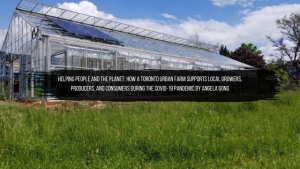 Masks, hand sanitizer, face shields. Stickers placed six feet apart, lining the floor and facilitating physical distancing. Clear, plastic windows at the checkout counter. These are familiar images in light of the COVID-19 pandemic, which has brought widespread disruption to the ways people obtain food. Some have turned towards growing produce to reduce the frequency of grocery store visits. Others have opted to stay away from stores altogether, utilizing online delivery services to have groceries brought right to their doors. And more people than ever are looking to local growers, within the city itself, for a sustainable source of food and transparency in how their groceries move through the supply chain. But how many of these changes are here to stay? Will urban growing be important to a building a resilient food system? And what is the long-term importance of sustainable, ethical, and transparent sourcing for consumers?
Fresh City Farms, a Toronto-based small-scale food distributor, is an important case study in examining how the pandemic has shifted consumer behaviours and informed the future of a resilient food system. Fresh City’s CEO and Founder, Ran Goel, describes the business as a “values-driven company” which aims to source locally and organically whenever possible, operate sustainably with minimal environmental impact, and maintain high labour standards at all points in their supply chain. A portion of their produce is grown right in the city, from their two growing locations at Downsview Park and Baka Mobile. The remainder of their produce and products are sourced from Southern Ontario and abroad, with an average of 70% of these groceries produced locally. Customers can order groceries online for delivery, or visit one of their eight locations across Toronto, including Fresh City stores as well as Mabel’s Bakery and Specialty Foods, and The Healthy Butcher, which were both acquired by the company in late 2018 and early 2019.
Masks, hand sanitizer, face shields. Stickers placed six feet apart, lining the floor and facilitating physical distancing. Clear, plastic windows at the checkout counter. These are familiar images in light of the COVID-19 pandemic, which has brought widespread disruption to the ways people obtain food. Some have turned towards growing produce to reduce the frequency of grocery store visits. Others have opted to stay away from stores altogether, utilizing online delivery services to have groceries brought right to their doors. And more people than ever are looking to local growers, within the city itself, for a sustainable source of food and transparency in how their groceries move through the supply chain. But how many of these changes are here to stay? Will urban growing be important to a building a resilient food system? And what is the long-term importance of sustainable, ethical, and transparent sourcing for consumers?
Fresh City Farms, a Toronto-based small-scale food distributor, is an important case study in examining how the pandemic has shifted consumer behaviours and informed the future of a resilient food system. Fresh City’s CEO and Founder, Ran Goel, describes the business as a “values-driven company” which aims to source locally and organically whenever possible, operate sustainably with minimal environmental impact, and maintain high labour standards at all points in their supply chain. A portion of their produce is grown right in the city, from their two growing locations at Downsview Park and Baka Mobile. The remainder of their produce and products are sourced from Southern Ontario and abroad, with an average of 70% of these groceries produced locally. Customers can order groceries online for delivery, or visit one of their eight locations across Toronto, including Fresh City stores as well as Mabel’s Bakery and Specialty Foods, and The Healthy Butcher, which were both acquired by the company in late 2018 and early 2019.
Fresh City’s produce bags being loaded into a delivery van. During the COVID-19 pandemic, Fresh City has implemented non-contact deliveries with larger windows, allowing them to serve more customers. The company is also reducing risk to customers by using recyclable cardboard boxes rather than their reusable tote bags. (Photo: Fresh City Farms)
Bread being made at Mabel’s Bakery. Fresh City acquired Mabel’s Bakery and Healthy Butcher in 2018 and 2019 as part of an ongoing effort to provide organic baked goods, meat, and prepared foods at their stores. Mabel’s uses high-quality, organic and locally-sourced ingredients to offer homestyle baked goods, artisan breads and cheese, and prepared foods and meals. (Photo: Fresh City Farms)